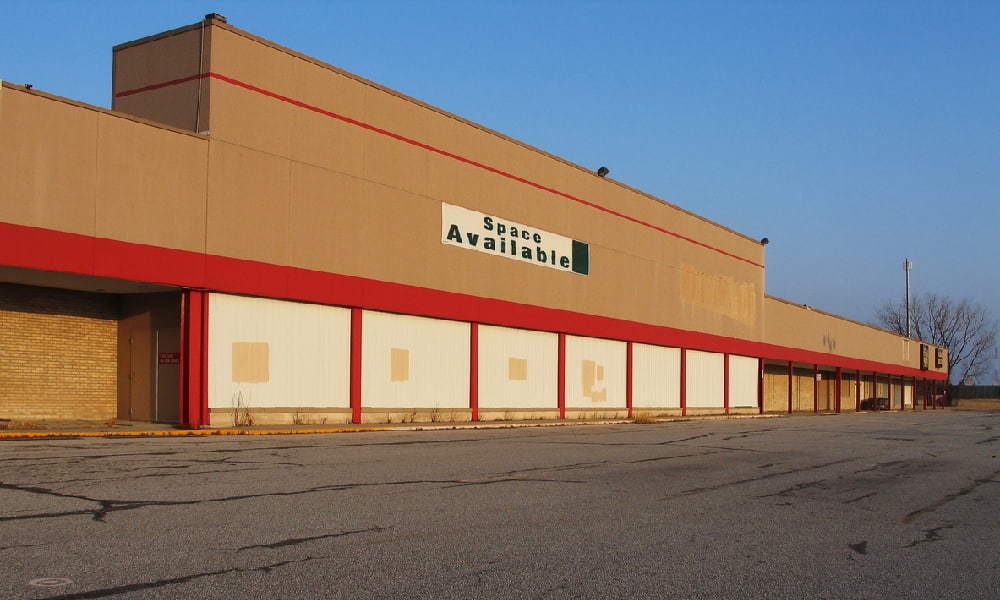Change is a constant in life, but it can be your enemy if you’re running a retail operation. That’s why savvy retailers try to mitigate sudden changes in their lease agreements. Here are a few things to keep in mind:
- A co-tenancy clause is an essential piece of documentation for any retail renter because it protects the business if the ecosystem surrounding the building breaks down.
- Shops are often reliant on surrounding companies to drive customers through their doors, and the absence of these businesses could cause financial issues.
- Retail lease agreements will often include a co-tenancy clause, which is language in the contract providing rent relief and other benefits if one or multiple tenants leave a shared property.
- An anchor tenant leaving a mall, for example, could hurt every other business in the building, making it challenging for them to survive.
- A co-tenancy clause might offer a rent reduction until a new anchor tenant moves into the mall and business begins to recover.
- It’s a good idea for any retail business relying on larger stores to attract customers to include this language in their rental contracts.
Every co-tenancy clause is different, because they depend on the space and how reliant the building is on one specific tenant bringing customers to the location. This guide will explain why a co-tenancy clause is vital for a small retail business and examine provisions these agreements usually include.
What Landlords Will Want to Include in the Contract
Negotiating a co-tenancy clause involves digging deep into dense legal language, because the contract will depend on the property and its tenants. There are some stipulations that most landlords will want to include in a co-tenancy clause, however, including:
– Default Protection
Your landlord will want to prevent you from invoking the co-tenancy clause if you’re already in default. This stipulation makes sense because it likely means your business was struggling before the anchor tenant left the property. Ensure you’re up to date on your bills, and this inclusion won’t be an issue for you.
– Provide Evidence
Things get a little trickier if the building owner wants you to prove that your drop in sales or reduction in revenue was caused by other tenants leaving the property. The evidence you provide might include operating statements or tax returns that show a clear decline in business after certain tenants left. You’ll have to prove that your drop in sales was due to the vacancies in other retail shops in the building before qualifying for relief.
– Limited Remedies
The property owner might want to limit the benefits the co-tenancy clause provides. Your landlord could, for example, agree to reduced rent or allow you to terminate your lease but not months of reduced rent followed by lease termination. The owner will want protection, so you’ll have to figure out if the limited remedies will work for you.
All these inclusions are up for negotiation, so you don’t have to live with them just because your landlord wants them. Ensure you’re aware of what this language means before finalizing the contract, so you aren’t surprised by the outcome later.

3 Vital Pieces of Information in Your Co-Tenancy Clause
Carefully reading and negotiating your co-tenancy clause is incredibly important because of the protections it provides. There are some standard pieces of information found in these clauses, but the variables they include will determine how much the clause assists you if key tenants leave a property.
1. Co-Tenancy Threshold
Perhaps the most critical piece of information in your co-tenancy agreement is the threshold for when you can invoke the clause. Some malls and retail buildings rely on a single big box store to drive traffic, so your co-tenancy clause might only kick in if that store changes location. The clause could also include a threshold on the number of retailers moving, such as a situation where 50% of a mall’s stores close.
2. Cure Period
Every co-tenancy clause will include information on the cure period, which is how long the landlord has to bring vacancies back below the threshold. This stipulation ensures the co-tenancy clause doesn’t kick in right away if tenants leave, and it gives the building owner a bit of time to find new renters. Keep in mind that tenants will prefer a shorter cure period, while the landlord will want as long as possible, so you’ll have to negotiate the exact timeline.
3. Relief Options
Your landlord will want to put limits on the relief you’ll receive, but the clause should also include the specific amount available to a tenant if the building falls beneath the co-tenancy threshold. The document might state that your rent is reduced to 5% of your gross sales if occupancy in the mall falls below 50%, for example, and that you have the right to terminate your lease if it remains in this state for more than six months. Every agreement is different, so you’ll need to negotiate based on your unique situation.
Your co-tenancy clause is sure to include some language on all three of those topics, so you’ll want to negotiate your deal carefully to ensure you’re adequately protected. Putting in the time and ensuring you have options if multiple tenants leave a building could save your business in the long term. Expert help is always advisable to help get the best terms on such complex contract language.
Get Expert Help When Negotiating Your Lease
Receiving assistance when negotiating the terms of your lease, including your co-tenancy clause, can optimize the protections your business has when renting a retail space. An expert negotiator can acquire concessions from your landlord, putting you in the driver’s seat if other tenants start leaving in a hurry.
The Genau Group offers lease negotiation and concession acquisition services for retail tenants in the Washington, D.C., area. We can also help you find the perfect property to meet your business’ needs and provide annual lease audits to keep the numbers working for you. Take a minute to contact our team for more information on co-tenancy clauses and other retail lease topics.





